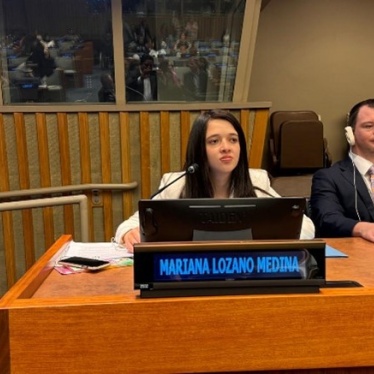The recently approved report “Corporate Social Responsibility: a new partnership” of the European Parliament gives renewed momentum to the corporate social responsibility (CSR) debate at the EU level. In the framework of the upcoming G8 meeting, the undersigning organizations invite the European Commission to take the EP's report seriously. As recommended in the EP resolution, which secured wide support from all major groups in the plenary session, the Commission should take a leading role in carrying out research and adopting concrete measures aimed at establishing a level playing field on CSR and ensuring that corporations behave responsibly.
The EP has strongly called on the Commission to further develop its approach to CSR, which to date has been limited to support for voluntary initiatives. The EP report, by contrast, acknowledges that a mix of approaches is needed to enhance the contribution of CSR to respect for human rights, environmental protection, labour standards and development policies. For the EU to truly become a “poll of excellence” for CSR, the Commission must also put in place an appropriate regulatory framework.
The EP's resolution shows that many stakeholders, not only NGOs, agree with the idea of setting standards in order to establish a level playing field for corporations, allowing consumers, investors and job-seekers to reward responsible companies and encourage those less responsible to improve their behaviour. In particular, the resolution mentions extending legal obligations to some key aspects of corporate accountability, such as directors' duties, foreign direct liability, environmental and social reporting, and mandatory disclosure for lobbyists. It is important to note that many of the issues merely require better implementation of already existing EU policies and legislation, rather than new regulations.
In this context, we call on the Commission to:
- Evaluate the current state of transposition into national law of the existing Fourth Council Directive 78/660/EEC and Directives 2003/51/EC and 2003/71/EC on reporting, accounts modernisation and prospectuses and to assess the effectiveness of its implementation in order to look into the creation of a standardised EU system of environmental and social reporting, alongside financial reporting;
- Reinforce the existing mechanisms of foreign direct liability to penalise European companies for violations in third countries, giving victims of corporate crimes the possibility to seek redress against European interests in European courts, on the basis of Regulation (EC) n° 44/2001 of 22 December 2000;
- Extend the responsibility of companies’ directors to their impacts on human rights, local communities, and the environment, in line with already existing legislation in some Member States, for example the Companies Act 2006 in the UK, and as a complement of the proposed EC Directive on Environmental Crime;
- Evaluate the transposition of 2004 public procurement Directives into national law with a view to further encouraging governments to include social and environmental concerns in public procurement policies at national, regional and local levels; and with a view to revising the existing framework where improvements are required, in particular in order to allow for the insertion of ethical clauses, referring to human rights responsibilities of companies, in public procurement;
- Uphold already existing standards like the OECD Guidelines for Multinational Enterprises and the ILO’s Tripartite Declaration in all its CSR policies by linking all forms of government assistance to companies and public procurement policies to adherence to these CSR tools;
- Develop a proposal for the creation of an EU monitoring mechanism on CSR to undertake independent inquiries on CSR issues on its own initiative or at the request of stakeholder groups and companies;
- Develop a clear proposal of how to integrate CSR issues into the Commission’s Corporate Governance Action Plan;
As these suggestions indicate, progress on CSR requires an approach that combines voluntary business initiatives with additional measures related to corporate accountability. We are conscious that voluntary initiatives on CSR can serve to promote awareness of CSR principles and their implementation by select companies. However, we firmly believe that upholding international human rights treaties, ILO conventions, international environmental agreements and abiding by national legislation should not be left to the discretion of individual companies. To the contrary, standards, regulations and accountability measures are needed to ensure that European businesses adhere to high social and environmental standards in their operations worldwide.
We are convinced that EU action to fully integrate and implement CSR in all relevant policies is essential for the success of the EU’s own commitments to tackling climate change, delivering sustainable development, promoting and defending human rights, respecting biodiversity, and creating growth and jobs.
We trust that you will not ignore the European Parliament’s resounding message and we would welcome an opportunity to meet at your convenience to discuss the above mentioned recommendations, soon.
We thank you in advance for your attention and we look forward to hearing from you.
Yours sincerely,
/s/
Ruth Casals
ECCJ
/s/
Arvind Ganesan
Human Rights Watch
/s/
Marco Cilento
ETUC
/s/
Paul de Clerck
Friends of the Earth Europe
/s/
Jorgo Riss
Greenpeace
/s/
Magda Stoczkiewicz
Bankwatch
/s/
Souhayr Belhassen
FIDH
/s/
Franz Floss
VKI Consumers Association of Austria








